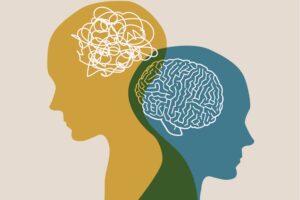Most people think therapy and medication are the only ways to treat depression, along with simply waiting until things start to look up. Though rehab is frequently associated with drug and alcohol abuse, rehab for depression is also available. Plus, if you are already struggling with substance abuse, getting treatment for your depression will intertwine with your treatment plan.
To learn more about rehab for depression and when you should seek it out, keep reading!
What Is Depression?
Depression is one of the most prevalent mental illnesses in the United States. This mental health disorder has various forms, including postpartum depression, seasonal affective disorder, major depressive disorder, and substance-induced depression. Treating depression is different for everyone because everyone experiences it in their own unique way.
Some common symptoms of depression are:
-
- Persistent feelings of sadness and emptiness
- Low self-esteem
- Irritability and frustration
- Difficulty sleeping or oversleeping
- Unplanned weight changes
- Loss of interest in activities
- Lack of energy and increased feelings of fatigue
- Thoughts of suicide
Seeking help in a mental health crisis can be very intimidating because there can be a lot of guilt surrounding the disease. It can feel like you are being dramatic about your issues or that they aren’t as serious as you feel they are, but we are here to tell you that’s not true. Depression is a silent killer that can completely disrupt your life.
What Is Rehab for Depression?
Rehab for depression is the next step after trying individual therapy and group therapy, support groups, and medication as treatment. Cognitive behavioral therapy (CBT) is often recommended for those dealing with mental health conditions like depression.
Rehab offers a more in-depth and monitored treatment for mental health issues like major depression. Many rehabilitation centers for depression will offer inpatient treatment programs where you can stay in the center and receive 24/7 care for even the most persistent types of depression.
Many rehabs that treat depression also treat co-occurring disorders, which include substance abuse with depression. Because these two so often go hand-in-hand, simultaneously treating them is essential to see improvements from effective treatment.
When Should You Go to Rehab for Depression?
If you or a loved one are struggling with depression, you should consider entering a rehab center. Getting help from an experienced treatment team can be the thing that changes the trajectory of your life and gets you back to feeling like yourself.
A few signs might help shed light on the fact that you need to seek help.
1. Self-Medicating Frequently
People who struggle with depression often find that medication, therapy sessions, or support groups simply don’t cut it. Many people will turn to self-medication if these methods don’t seem to offer results. Coping by using substances can seem to alleviate symptoms of depression, but they only make them harder to overcome.
When you are depressed, you lack dopamine and serotonin in your brain, making it more difficult to feel any feelings of happiness. Some drugs and alcohol can trick your brain into feeling a rush of happiness.
This itself can become addicting, leading to the overusing of substances. In addition, many young adults and older adults self-medicate by developing eating disorders to gain more control over their lives.
If you’re self-medicating through unhealthy coping methods, an evaluation from a mental health professional can help. In many cases, professional intervention is necessary to help you break free from the spiral of addiction and move toward stability.
2. You’re Struggling in Your Relationships
Personality changes are very common when you struggle with depression. As a result, many stressors can add to your personal relationships as you suffer from the disease, decreasing your overall wellness. You may lose interest in hobbies you once shared with friends, and not be able to maintain romantic relationships, both old or new, which can result in frustration from your friends and family members.
Many people begin to feel isolated or lonely, despite whoever is around them during this time. In turn, they push people away and can damage bonds with people that care about them. Treatment is a way to show your loved ones that you are trying to get better, and sometimes being away from them can alleviate the guilt you feel for neglecting those relationships.
3. Having a Hard Time at Work or School
Whether you love or hate your job or school, depression only makes things harder. You might find that you are missing deadlines, not following up with emails, or forgetting tasks you must complete.
It might become apparent if you aren’t performing as well as you used to or can’t keep up with your peers. This could deter your life’s trajectory because you can miss great opportunities.
People who suffer from depression can still maintain jobs, but the quality of work they put in or the effort they can give will show. If you or a loved one has lost their job or is falling behind in school work, rehab for depression might pull them out of the darkness.
4. Feeling Like a Failure in Everyday Activities
When you suffer from depression, taking care of yourself and everyday tasks can feel overwhelming. If you have noticed that you cannot keep up with hygiene or chores, treatment might be a good option for you.
By leaving your normal environment and getting involved in a new daily routine at a depression treatment center, you might begin to feel like yourself again. Sometimes being in one spot with so much negative energy can make it difficult to get better. Leaving that space and starting fresh might be just what you need.
5. Thoughts of Suicide
Depression is a serious mental illness. If you or a loved one are beginning to feel suicidal or like you want to harm yourself, please seek immediate help. You can reach out to the National Suicide Prevention Lifeline at 1-800-273-8255 to talk with them about what you are feeling.
Reaching out to someone you trust and asking for help is never the wrong answer, even though it might be scary. People love you and want to see you getting better, so don’t hesitate to reach out. You are not a burden.
Getting Help With Soba
People who struggle with both depression and substance use disorder might find Soba Recovery Center of San Antonio, Texas, a great place to start. We develop a personalized treatment plan that focuses on both aspects of your mental health. We understand that you can’t treat one disorder without treating the other.
From inpatient to outpatient services, we have treatment options that will be right for you. You don’t have to wait a minute longer before seeking help for your depression. You can reach out to a Soba representative to talk more about how we might be able to help you on your path to recovery.
Sources:
Depression and Everyday Social Activity, Belonging, and Well-Being | NCBI





